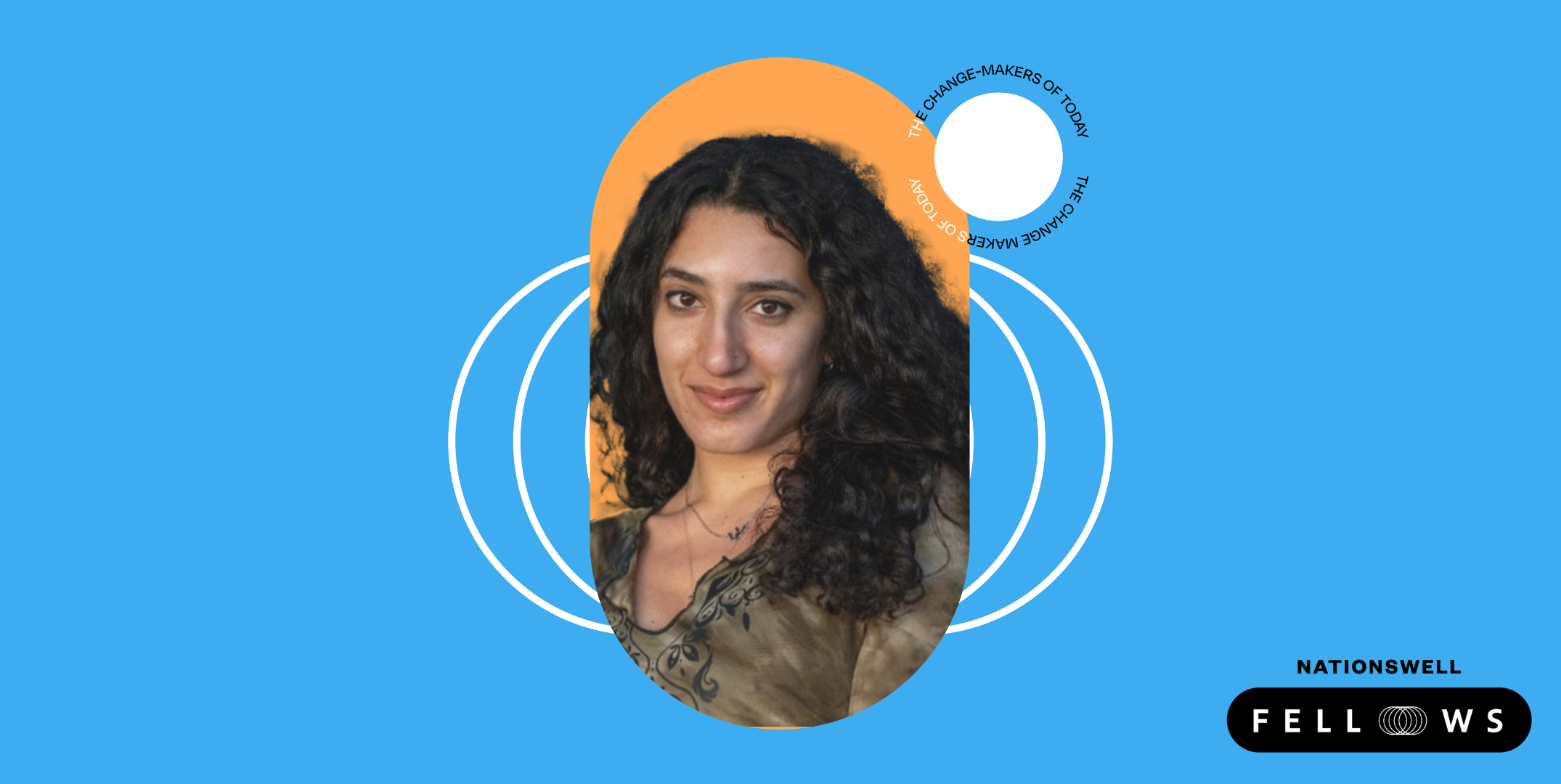With the support of the American Family Insurance Institute for Corporate and Social Impact, Cerberus, and ServiceNow, NationSwell has just completed a second year of the NationSwell Fellows program, which supports young leaders through skills-building workshops, mentorship, and access to an expanded network and resources. Over the course of 10 months, this impressive group of young people worked to co-design fellowship programming, create community with one another, connect with mentors, and develop and refine individual incubator projects.
This cohort of young changemakers were highly accomplished outside of the program and highly intersectional in their approaches to their social issues. These young innovators devoted themselves to a variety of social impact areas including mental health access and awareness, climate justice, LGBTQIA+ rights, youth unhousedness, data for good, and Indigenous rights. In this series, NationSwell is highlighting a few outstanding fellows and giving you insight on how to support them.
In this installment, we talk with Maya Salameh, who believes in better mental healthcare, including increased access and awareness, and improved cultural competency, for Arab Americans. Her incubator project was a comprehensive literature review to progress the resources available to clinicians, researchers, and others who have a stake in the mental health journey of the Arab American community.
Tell us about your journey to social impact and Arab American mental health work. What was the moment you knew you wanted to devote your professional life to what you’re doing now?
My journey to social impact work and passion for Arab American mental health technically began at Stanford. As a Psychology undergraduate and Sociology graduate student, I participated in research at the intersections of social science, care access, and racial justice. But even before that, I grew up acutely aware of how Western wellness models seemed to exclude people like me. I remember being told by my relatives that therapy was “for Americans.” But I witnessed firsthand a community need for culturally competent care, and I became passionate about making mental health resources more accessible to all Americans, especially hyphenated ones.
A pivotal moment in my work was the opportunity to develop my honors thesis, an interview study I conducted in 2022 with 35 Arab Americans, investigating their experiences with psychological care and definitions of mental health. This work affirmed for me the urgent need for more inclusive and culturally sensitive mental health resources, and also highlighted other knowledge gaps in the limited research, especially for gender and sexual minorities within the community.
What are some of the ways this fellowship has been able to support your work? What have you gotten out of it, and has anything surprised you along the way?
The NationSwell Fellowship has been instrumental in advancing my work. The funding and brainstorming space allowed me to devote capacity to this nugget I’d had on my mind for the last two years. Getting to develop this literature review on the psychological care experiences of queer and gender-marginalized Arab Americans allowed me both to build upon my previous research and to contribute to the limited knowledge base on this minority within an already invisibilized identity. I invite you to read it here. My mentor Patrice Berry also offered valuable insights on building a social impact career as a woman of color and the many ways one can continue contributing to community-based research outside of academia.
What surprised me the most was the incredible network of like-minded young leaders I got to connect with! Our cohort’s collaborative environment and shared commitment to social change helped me refine my approach and broaden my perspective on impactful social work.
What’s the focus of your work right now? And what’s next for you?
My work currently focuses on improving Arab American and other immigrant communities’ access to psychological care and public benefits. I have the honor of contributing to the Digital Benefit Network at the Beeck Center, where I support their measurement and evaluation approach as they work across verticals to make benefits more accessible and equitable. Generally, I remain interested in the development of new community-based interventions for immigrant communities and leveraging digital advancements to enhance public services.
Looking ahead, I’m attending UCLA Law in the fall to continue my research and advocacy efforts, aiming to influence policy changes that will improve legal protections and benefits access for immigrant communities. I plan to specialize in Critical Race Studies and engage in clinics like the Immigrants’ Rights Policy Clinic. I am especially looking forward to entering law school on the heels of the newly approved MENA category on the Census. This rollout will likely create new opportunities for Arab lawyers to advocate for their communities, as well as present new questions and debates around federal resource allocation, civil rights, and legal protections for Arab Americans.
By integrating my research background and evaluation experience with legal skills, I aim to advocate for laws that not only alleviate discrimination but actively promote racial equity. As an Arab woman, and the first lawyer in my family, I aim to represent all my communities with integrity and dedication.
How can NationSwell’s ecosystem of social impact leaders and partners help you with your short term and/or long term goals?
In the short term, I’m seeking opportunities to collaborate with organizations focusing on mental health and marginalized communities to apply my research insights and contribute to culturally based resources.
In the long term, I aim to build a network of advocates and professionals committed to enhancing the safety net for all Americans, whether in terms of benefits access, psychological services, or legal protections. Support through mentorship or collaboration to share my research and findings would be incredibly valuable.
To learn more about the NationSwell Fellows program, visit our fellowship hub.

 "
"